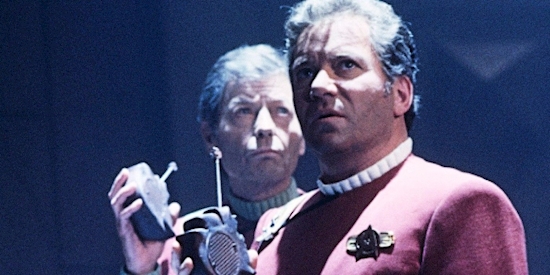Star Trek 6: What The Title “The Undiscovered Country” Means
The unusual title Star Trek VI: The Undiscovered Country is derived from William Shakespeare, but it takes on a different meaning in the movie's context from what the Bard intended in Hamlet. The sixth and final film starring the cast of Star Trek: The Original Series, The Undiscovered Country was directed by Nicholas Meyer, who also helmed the acclaimed Star Trek II: The Wrath of Khan. It's also the most Shakespeare-influenced Star Trek movie, with the dialogue boasting numerous quotes from the Bard's other plays — mostly spouted by the evil Klingon General Chang (Christopher Plummer). But "the undiscovered country" line is crucial to understanding how Star Trek VI impacted the franchise, going into Star Trek: The Next Generation's 24th-century era.
Click the button below to start this article in quick view. Start nowIn Star Trek VI, the Klingon Empire suffered a catastrophe when their moon Praxis exploded, which crippled their economy. With less than 50 years of life left, the Klingons reached out to the United Federation of Planets and initiated peace talks; however, the potential end of decades of hostilities terrified factions within the Klingons, the Romulans, and Starfleet. Despite his own reservations, Captain James T. Kirk (William Shatner) and the crew of the Starship Enterprise were appointed as the Federation ambassadors to meet with High Chancellor Gorkon (David Warner), but Gorkon was assassinated by conspirators led by General Chang and aided by Spock's (Leonard Nimoy) own protege, Valeris (Kim Cattrall). Kirk and Dr. Leonard McCoy (DeForrest Kelley) were framed for Gorkon's murder, imprisoned, and nearly executed before Spock rescued his friends. Together, they uncovered the sinister conspiracy and saved Federation's new alliance with the Klingons.
However, before the Klingons killed their own Chancellor, they dined with Kirk and his senior staff aboard the Enterprise, where Gorkon led a toast over Romulan ale to "the undiscovered country — the future."Spock immediately identified Gorkon's reference to Hamlet, Act 3, Scene 1, which was the title character's famous "To be or not to be" soliloquy. Hamlet, contemplating suicide, called what's on the other side of death (the afterlife) "the undiscovered country." However, Gorkon, who is a fan of Shakespeare and encourages hearing the Bard's words spoken "in the original Klingon," equated the undiscovered country to the future of his Empire and Starfleet as allies and friends — an idea that was previously inconceivable. Dr. McCoy then toasted Gorkon as "the architect of that future." Meanwhile, Chang directly quoted, "to be or not to be," voicing his own fears that friendship with humans would mean the end of the Klingon's civilization.
Although Star Trek: The Next Generation debuted in 1987 — four years before Star Trek VI hit theaters — The Undiscovered Country laid the groundwork for the Klingons' lasting peace with the Federation as seen in TNG. Proof positive is the fact that Worf (Michael Dorn) is a senior officer aboard the U.S.S. Enterprise-D under Captain Jean-Luc Picard (Patrick Stewart). It's thanks to the efforts of Kirk, Spock, and the Enterprise's crew to keep Gorkon's dream of coexistence alive that peace was achieved and held throughout the 24-century. Although hostilities between Starfleet and the Klingons resumed for a time on Star Trek: Deep Space Nine, the two great Alpha Quadrant powers were soon reunited to fight and win the Dominion War.
Interestingly, director Nicholas Meyer originally wanted Star Trek II to be titled The Undiscovered Country, which would have reflected Spock's death and the beloved Vulcan boldly going into the great unknown. However, Leonard Nimoy changed his mind about wanting to stay with Star Trek as Spock, and this, coupled with George Lucas changing the title Revenge of the Jedi to Return of the Jedi, prompted Paramount to change the title of Star Trek II to The Wrath of Khan (which would also distract fans from Spock's demise in the film). Meyer was furious that Paramount went against his wishes, but the studio got its way.
Meyer later got his way and he was able to successfully title Star Trek VI as The Undiscovered Country. Ultimately, Star Trek VI was the better movie to receive that Shakespeare ode since its now-dual meaning — death and the unknown future — carried greater weight because Trekkers now know everything the TOS crew fought for truly did last into TNG's era of Star Trek.
Source: screenrant.com

